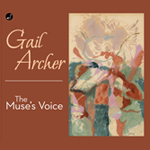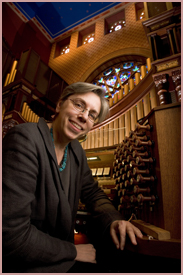ORGAN VIRTUOSA GAIL ARCHER
plays a program of music from her latest album The Muse’s Voice: A Celebration of Women Composers
WHEN: Sunday, May 4th, at 4:00 PM
WHERE: First Presbyterian Church, 120 East State Street, Trenton, NJ
ADMISSION: FREE.
For more info, call 609.396.1712 or visit www.old1712.org.
Internationally renowned concert organist and recording artist Gail Archer releases her seventh solo album with The Muse’s Voice: A Celebration of Women Composers performed on the Gabe M. Wiener Organ (Casavant, 2002) at New York City’s Central Synagogue. Featuring works by today’s leading female composers including Jennifer Higdon, Nadia Boulanger, Jeanne Demessieux and Judith Bingham, The Muse’s Voice enthralls listeners with Archer’s ability to leap seamlessly from baroque to late romantic and modern eras.
“…compelling, programmatic, and a dazzling virtuoso display.”– Kansas City Metropolis
“…bracing physicality… a sense of vulnerability and awe.” – New York Times
 As one of the few female organists in a male-dominated field, Archer serves as an advocate for female organists and composers. “I’m on a mission to celebrate women organists and composers in liturgical music,” says Archer. “With the advent of this recording, I hope to share this captivating and important catalog of music to a much broader audience.” Archer has been promoting female artists by: programming and performing works by women such as Joan Tower and Alla Borzova at some of the world’s finest religious institutions; creating and curating MusForum.org (a website dedicated to women organists); and most recently, recording The Muse’s Voice.
As one of the few female organists in a male-dominated field, Archer serves as an advocate for female organists and composers. “I’m on a mission to celebrate women organists and composers in liturgical music,” says Archer. “With the advent of this recording, I hope to share this captivating and important catalog of music to a much broader audience.” Archer has been promoting female artists by: programming and performing works by women such as Joan Tower and Alla Borzova at some of the world’s finest religious institutions; creating and curating MusForum.org (a website dedicated to women organists); and most recently, recording The Muse’s Voice.
Archer, the chair of the music department at Barnard, director of artist and young organ artist recitals at Central Synagogue, and concert organist at Vassar, has released such albums as J. S. Bach — The Transcendent Genius, Mendelssohn in the Romantic Century, A Mystic in the Making — Olivier Messiaen, and Franz Liszt — A Hungarian Rhapsody.
Known for her musicality and sensitivity and for giving her interpretations a visceral quality, Archer is hailed for maximizing the organ’s colors and capabilities. According to the New York Times, she plays with “a sense of vulnerability and awe.”
Opening the album are works by two influential French organist/composers: Nadia Boulanger (1887-1979) and Jeanne Demessieux (1921-1968). Prelude, Petit Canon, and Improvisation (1911) are the only three published compositions for organ written by Boulanger. Composed for inclusion in an anthology of modern French compositions, they achieve great variety of expression in spite of their apparent simplicity. Boulanger studied organ at the Paris Conservatoire yet never held a regular position as organist. She is remembered foremost as one of the 20th century’s most discerning and remarkable teachers. The album’s second piece, Te Deum (1965), is one of eight solo organ works composed by Demessieux. Unlike many organ compositions based on chant, this plainsong melody is not an improvisatory fantasia. Allegedly, it was inspired by the sound of the State Trumpeters at St. John the Divine in New York. Demessieux had a brilliant international career as a virtuoso and was the first female organist to perform at Westminster Abbey.
The CD’s dose of American contemporary classical music comes from Pulitzer Prize and GRAMMY winner Jennifer Higdon (b. 1962) - one of the most performed living American composers working today. Her Ceremonies Suite (2001) is excerpted from an earlier seven-movement work entitled Ceremonies for organ and brass. “The title refers to the various ways in which we celebrate the many aspects of life through religious and secular ceremonies...from solemn and contemplative to joyous and dancing,” explains Higdon.
The album culminates with the epic seven-movement, 35-minute work The Everlasting Crown (2011) by the British composer Judith Bingham (b. 1952). Premiered at London's Royal Albert Hall during the 2011 BBC Proms, The Everlasting Crown is based on a fictitious crown made up (in)famous gem stones. The work evokes seven of these each representing aspects of monarchy and power and demonstrated through several different styles of organ playing. This ambitious cycle calls on Archer to grasp an unusually grandiose arrangement and to deploy the full depth and range of the organ.
Gail Archer is a GRAMMY-nominated, international concert organist, recording artist, choral conductor and lecturer. In spring 2010, she celebrated the 325th anniversary of the birth of Johann Sebastian Bach with six concerts around New York City, concluding with the Art of Fugue at Central Synagogue.
Lucid Culture proclaimed, "Like the composers she chooses, Archer's playing spans the range of human emotions—with Bach, there’s always plenty to communicate, but this time out it was mostly an irresistibly celebratory vibe."
During the 2012-2013 season, Archer promoted her new recording Franz Liszt, A Hungarian Rhapsody; highlights included recitals at The Cathedral of All Saints, Milwaukee, WI, Cathedral of St. Joseph the Workman, La Crosse, WI, Gethsemani Abbey, Trappist, KY, Syracuse University, Syracuse, NY, Community of Christ Temple, Independence, MO, to name a few. In summer 2013, she was featured by the Philharmonic Societies in Irkutsk, Krasnoyarsk, Tomsk and Perm, Russia, and played in festivals in Alessandria, Grondona and Scopello, Italy, Tubingen and Hamburg, Germany, and Copenhagen, Denmark. Archer is college organist at Vassar College, and director of the music program at Barnard College, Columbia University where she conducts the Barnard-Columbia Chorus. She serves as director of the artist and young organ artist recitals at historic Central Synagogue, New York City.
